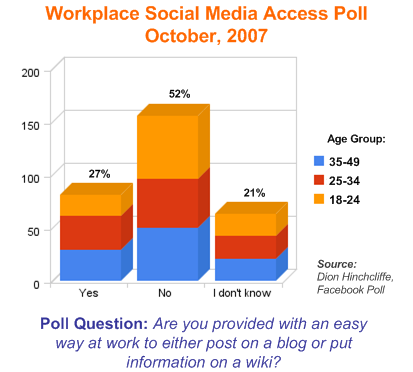Significant workplace inroads for Enterprise 2.0?

According to a random poll I recently conducted on Facebook, just over a quarter of 300 respondents -- 27% of them in all -- answered in the affirmative that they are provided with an easy way at work to post on a blog or put information on a wiki. I often ask this same question to gatherings of people whenever I get the chance these days and have been getting roughly the same answer for the last few months. Businesses are apparently starting to take Web 2.0 for a more serious spin.
Blogs and wikis may finally be seeing fairly widespread "business approved" adoption in the workplace.A year ago, accessibility to blogs and wikis in the workplace was less than half this number in my informal sampling. The growth trend seems clear and appears to be increasing. So while this data might be fairly unscientific, I suspect the number is pretty accurate, and social media, aka Enterprise 2.0, is finally making some measurable inroads in the workplace despite a few open concerns about these mediums.
Facebook as a measure of social media in the general workplace?
Of course, Facebook users in general are probably more digitally literate than the average population, will look for blogs and wikis on the local Intranet to use, and thus some say they may be more likely to gravitate to workplaces and jobs that would provide an environment with familiar tools. However, one odd breakdown in the demographics of the poll is that the youngest group, 18-24 year-olds, reported the least access to social media. Perhaps it's because this group also includes a great deal of students or that entry level workers don't have as much computer access as workers farther up in the hierarchy.
Poll respondents were also pretty sure when they weren't being provided with these tools with only 21% reporting that they didn't know if they were being offered them. A whopping 52%, just over half, said that they had no social media tools offered to them in a way they could access.The poll question was also carefully posed to uncover if tools were being "brought in the back door" by workers using the hundreds of free social media platforms out in the Web with their browser at work, or if the workplace itself was providing enterprise blogs and wikis. In my opinion, this makes the 27% "yes" number almost surprisingly high. But, while some respondents may not have parsed the question clearly, the trend is strong enough to stand on it's own:
Blogs and wikis may finally be seeing fairly widespread "business approved" adoption in the workplace.
Getting good business outcomes from social media while managing downside
While blogs and wikis continue to show the potential to greatly improve collaboration, create higher levels of knowledge retention, and generate more reusable business information over time, it's also probable that in attempts to access the benefits of Enterprise 2.0 platforms, these new platforms will incur some issues that IT departments and the business will have to deal with, particularly if these platforms are exposed outside the organization.
What are the business benefits and issues of social media? The diagram above depicts the world of traditional software and native PC applications with expanding access to the "2.0" generation of new software models and platforms. Here's a more detailed run down of the pros and cons that will have to be balanced in most organizations when deciding on providing access to these types of social media tools to their workers.Notes: Social media is just one important aspect of Enterprise 2.0, but the one most likely to see near-term, widespread adoption. Also, the diagram above clearly shows the social media is a new aspect to the enterprise and will more likely to enhance existing IT systems over time rather than replace them outrighte with the possible exception of enterprise content management.
Reported social media in the workplace benefits:
- More ad hoc collaboration between employees who can find each other's work and team together.
- More globally persistent, discoverable business information is made available over time.
- Social media tends to capture more institutional knowledge that's reusable.
- A deep hyperlink infrastructure begins to form, built by continuously by workers using social media. tools to forge links, making business information more discoverable.
- Tagging and other emergent organization methods allow business information to be organized and cross-referenced from every point of view.
- More efficient access to information as more business information becomes available internally and externally via syndication.
- Potentially higher levels of innovation and productivity as more previously unavailable enterprise thinking is available to be accessed, repurposed, and built on top of.
- Increased efficiency in conversations: social media scales up to mostly resource and time friendly conversations among thousands of asynchronous participants, yet excludes those uninterested in them, unlike e-mail distribution lists and conference calls.
Reported social media in the workplace issues:
- Productivity: Users employing social media tools for non-productive purposes such as socializing.
- Security: Information that should be under tight control appearing on publicly via social media, either accidentally or intentionally.
- Control: The level of control over what appears on an organization's Intranet will decrease with the rise in use of social media, for better or worse. See the ticket scalping story in my previous post for a good, though seemingly rare, example of misuse. Also note that unlike e-mail, control of social media can be more successfully retroactive.
- Outcomes: Ensuring that social media tools are generated pre-defined, specific goals is difficult when the the extremely freeform platforms of social media can be used for everything from managing projects to tracking a department's fantasy football game.
- Another silo: Right now social media is primarily a consumer-side invention, like many aspects of Web 2.0. Consequently, most enterprise blogs and wikis don't have good access to feeds of enterprise data and this can encourage cut-and-paste publishing of information from traditional enterprise IT systems into social media, creating another silo of data.
- Trust: How can the usefulness of the content in social media platforms be trusted. The Web has partially solved this with techniques such as inbound link counting, but reputation and voting systems are starting to appear, often as plug-ins such as the highly capable new comment and reputation add-on release from Intense Debate, for social media tools. Despite this, until the tools become mature, trust will likely continue to be an issue for many uses of social media in the workplace.
- Not-enterprise ready. I've talked plenty about the enterprise context for blogs and wikis last year. The good news, many of these issues are starting to be addressed in the latest crop of Enterprise 2.0/social media offerings.
I'll continue to run this poll on a periodic basis going forward and see what we can learn about the adoption of social media in the workplace. In the meantime, please share your stories about blogs and wikis at work in Talkbalk below.
How are you seeing social media and Enterprise 2.0 being used in your organization?
